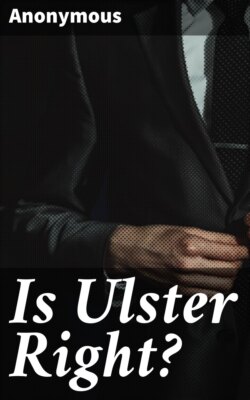Читать книгу Is Ulster Right? - Anonymous - Страница 3
PREFACE.
ОглавлениеIn the following chapters I have endeavoured to lay before ordinary readers a simple statement of the present position of the Irish question. Following the maxim of Confucius that it is well "to study the Past if you would divine the Future," I have first shown that the tales which are told about the glories of the ancient Celtic Kingdom are foolish dreams, not supported by the accounts given by contemporary annalists or the investigations of modern writers, and that Ireland never was a nation in the political sense, with the possible exception of the few years between 1782 and 1800, during which the Irish Parliament was independent; that the charges made against the English government with reference to their action between the "Conquest" by Henry II and the assumption of the title of King by Henry VIII are baseless; and that though there is much which the historian must look back upon with regret in the period between the reign of Henry VIII and the passing of the Act of Union, it is mere waste of time now to dwell on the wrongs of a former age which have long since passed away and which in any other country would be forgotten. Then I have traced the brief history of the independent Parliament, and shown that whatever may have been its virtues or its failings, it would be impossible to revive it now; all the circumstances of the country have changed. I have striven also to make it clear that the Nationalists of to-day are not the representatives of the leaders of that Parliament but of the party which fought against it and brought on the horrors of the Rebellion; that the Union was a political necessity, if the connection between the British Islands was to be maintained at all; and that if the people of Ireland have not derived all the benefits from the Union which they might have done, it is their own fault, as the history of Ulster during the last century has shown. Next, I have explained the rise of the present Home Rule movement, and its dependence on agrarian agitation. I have analyzed some of the provisions of the present Bill, which independent writers consider to be hopelessly unworkable; and lastly I have stated why in my opinion Home Rule in any form must be fraught with disaster not only to Ireland but also to the Empire at large.
I have no desire unnecessarily to wound the feelings of those who take a different view; if it can be shown that any of my statements are incorrect or my inference illogical, I shall be glad to correct them; but to mere abuse, such as the Nationalists are in the habit of pouring on Unionist writers, I shall pay no heed. I admit that it may be said that there are several matters which I ought to have gone into more fully; to that I can only reply that I wished to be as brief as possible, and that I have done my best to compress with fairness. What I am really anxious to do is to draw the attention of thoughtful readers, before it is too late, to the terrible dangers with which we are faced. As an Irish historian has said:-
"No political madness could be greater than to put the legislative machinery of an integral and essential portion of the Empire into the hands of men who are largely or mainly disaffected with that Empire, and who, in times of difficulty, danger and disaster are likely to betray it."
The following are the principal works of which use has been made in preparing this volume. They are cited here in order to avoid the necessity of constant footnotes:-
"Short History of the Irish People." By Professor Richey.
"Irish Nationalism." By the late Duke of Argyll.
"History of Ireland in the Eighteenth Century." By W.E.H. Lecky.
"History of the Legislative Union of Great Britain and Ireland." By Dunbar Ingram.
"Ireland and Her Fairy Godmother." By J. Warren.
"The Continuity of the Irish Revolutionary Movement." By Prof. Brougham Leech.
"A Fool's Paradise." By Professor Dicey.
